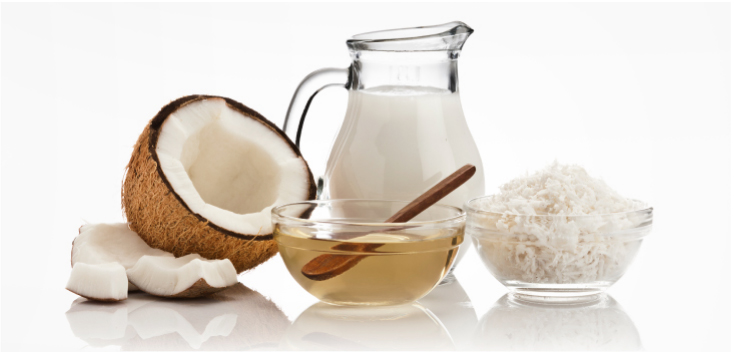Coconut: Just a Craze or a Super Food?
Posted by in Uncategorized
It’s safe to say that coconut water led the charge to take advantage of coconut, the ingredient technically known as a “fibrous, one-seeded drupe,” yet often casually referred to as a fruit, a nut, or a seed.
Regardless of the naming trope, whenever we can attribute health benefits to a natural, widely available substance such as coconut, the marketing and commerce will begin. In this case, however, the lovely coconut has earned its new identity as a super food many times over.
Let the races begin and the water flow. Coconut water began its popularity as a significant source for replacing electrolytes lost while sweating during exercise and outdoor activities. Today, products derived from coconuts are sold and used widely for food, skin care, and even hair care. Moreover, where they were once only available in specialty stores, such products have now found their way into mainstream supermarkets and large discount stores.
So, is this just a craze, or are the many health benefits of coconut powerful enough to define it as a super food? Let’s look at some evidence.
The Many Health Benefits of Coconut
Only a few years ago, coconut was ironically regarded by the medical community as a contributor to heart disease because of its saturated fat content. With time, however, as medicine has embraced the wisdom of nutrition, its understanding has matured to more accurately appreciate the difference between the health impacts of saturated plant fats versus the negative effects of saturated animal fats.
Coconut Oil
Despite the fact that coconut oil has an 87 percent saturated fat content, the presence of 2 fatty acids known as lauric acid and caprylic acid make coconut oil a desirable fat. Lauric acid exhibits potent antiviral activity and has been demonstrated to raise HDL cholesterol molecules, while caprylic acid acts as a natural antifungal agent. Moreover, much to our delight in the kitchen, coconut oil has a high smoking point and has thus become a popular cooking item for foods that demand a higher cooking temperature.
Coconut Milk
Coconut milk and its various derivatives provide a tasty alternative for individuals requiring or seeking something other than standard dairy products. Coconut milk is naturally low in carbohydrates and sugar-free, making it an ideal choice for those with hyperglycemia, insulin resistance, and diabetes.
Coconut milk is typically made from coconut meat and water. There are many versions of coconut milk available to purchase today, from full-fat organic milk (packing 445 calories per cup and 48 grams of fat) to unsweetened organic coconut milk (delivering only 45 calories per cup and only 4.5 grams of fat). In addition to its variety of milk offerings, coconut milk has also been made into yogurt (delivering 6–8 grams of fiber per cup), coffee creamer, and ice cream.
Coconut Water
Since the earliest days of my practice, I have been recommending that people drink coconut water during moderate workouts as a healthier alternative to “sports drinks.” Every 8 ounces of coconut water delivers 10 percent of the body’s daily need for potassium, an electrolyte typically lost through sweat. Coconut water is a good source of potassium, and each cup contains only 45 calories.
Coconut water can also be used as a base for making a nondairy kefir. Introduced to us through the Body Ecology Diet, young coconut kefir (YCK) is simple to make and delivers a rich culture of powerful probiotics.
Coconut Meat
Coconut meat is an ideal snack choice for individuals with high blood sugar, insulin resistance, and diabetes. Each 2×2-inch piece of raw, fresh coconut meat delivers only 7 grams of carbohydrates, 4 grams of fiber, and 15 grams of fat. Due to the high fat content, the calorie content is also high, and therefore only small amounts should be consumed by those following a calorie-restricted diet.
Coconut meat is available in several forms, such as chunked, flaked, and desiccated. Always look for the unsweetened varieties if available.
Coconut Flour
Coconut flour is high in fiber, containing 5 grams of fiber and 2 grams of fat per 2 tablespoons. This nutritional content makes coconut flour an ideal choice for individuals with high blood sugar, insulin resistance, and diabetes.
Super food? Oh yes.
Let’s apply it to make a super snack!
Coconut Flour Carrot Zucchini Pancakes
Ingredients
1 cup organic carrots, shredded
1 ½ cup organic zucchini, shredded
3 tablespoons organic coconut flour
3 large free-range organic eggs
½ teaspoon Himalayan salt
¼ teaspoon fresh ground black pepper
Dried herbs to taste
I use a combination of parsley and basil.
If you want to use the pancakes as a side for a bowl of soup or salad, you can also add in a sprinkle of garlic and onion powder for a more savory flavor.
Process
- Shred the carrot and zucchini and blot to remove excess water.
- Beat the eggs and add to the shredded carrot and zucchini.
- Stir in the coconut flour, salt, pepper, and herbs.
- Melt a little coconut butter in a large skillet.
- Using a ½ cup measure, pour the batter into the skillet.
- Lightly fry the pancakes until they are crispy and brown on the underside.
- Flip and brown the other side. Continue to flip and brown until the pancakes are dark brown (but not burned) and firm enough to transfer to the plate without tearing apart.
- Place the cooked pancakes on a plate lined with a paper towel. Blot off the extra fat.
- Serve warm.
Note
Be sure to blot enough water out of the zucchini, or the batter will be soupy.
Live Vitality Now!
(original post on boomspot)
You can follow any responses to this entry through the RSS 2.0 You can leave a response, or trackback.



Leave a Reply